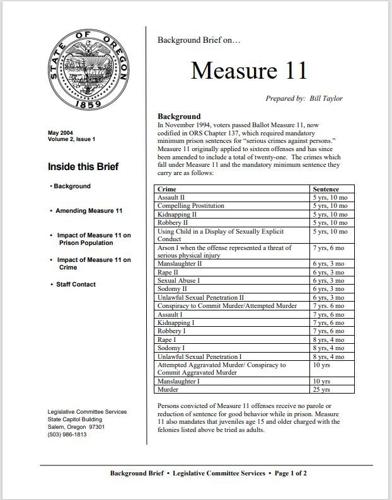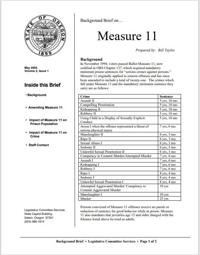The bill would only apply to first time offenders who committed a crime that was not murder.
SALEM, Ore. -- Senate Bill 320, a bill proposed in the Oregon Legislature, would allow for reduced sentences for individuals who committed major crimes. The reductions would come under certain criteria, and apply to those sentenced under Measure 11.
Measure 11 was approved by voters in 1994, and created a mandatory minimum sentence for certain serious crimes like robbery, manslaughter, rape, and arson.

Measure 11 is what instituted the minimum mandatory sentence in Oregon in 1994.
The sentences range from five years and 10 months for kidnapping, to 25 years for murder. Under the current measure, when an individual is convicted of one of the serious crimes mentioned, the convicted person could receive no less than the minimum sentence outlined. They also would not be eligible for parole or a sentence reduction.
According to the proposed bill, a person would be eligible for a reduction in their sentence if they are a first time offender, if they demonstrate appropriate institutional behavior, and if they participate in certain programs.

The proposed SB 320 could allow for reduced sentences for those serving time for serious crimes.
Cate Duke is with Mothers Against Drunk Driving, and she believes the bill will have a strong effect on those initially impacted by Measure 11 crimes.
“They're harmed and victimized by that initial crime,” Duke said. “They're re-victimized and traumatized through the judicial process, but they come out at the end holding onto this piece of justice that they've been given through that process. And this bill steals part of that justice away.”
Patty Youngblood, on the other hand, founded the group Time Does Not Fit the Crime, and she believes the bill will give inmates the motivation to turn things around.
“Some of those first time offenders had one moment time in their life of 'what did I do, and why did I do it,'” Youngblood said. “And to make communities safer, our inmates, adults in custody need to have incentives to improve.”
Jim Simonis lost members of his family in a drunk driving accident. For him, a Measure 11 sentence offered some closure.
“And it's so hard, you know when you're going through the court process, you know trying to -- trying to find out what's going to happen to him and us and the whole situation,” Simonis said. “And then it is a big comfort when you find out that something does rise to the level of being a Measure 11 crime.”
There is a public hearing scheduled for the bill for April 3. In the meantime, interested groups or individuals are able to leave their written testimony in support or opposition against the proposed bill on the legislature’s website.





















